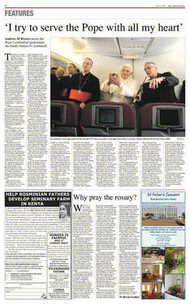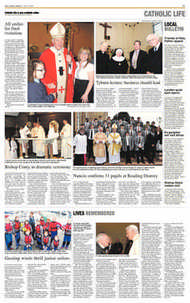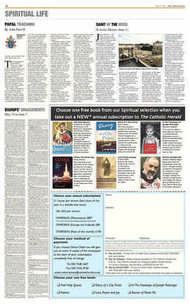Page 14, 29th May 2009
Page 14

Report an error
Noticed an error on this page?If you've noticed an error in this article please click here to report it.
Tags
Share
Related articles
Where Goodness, Truth And Beauty Meet
Theatre
Now Even Clare Short Is A 'top Catholic ,
Waiting For Godot
In Search Of A Saint Augustine For Today
A sell-out show that diminishes Beckett’s classic
Two tramps blather about nothing in particular. All they ask for is recognition that they exist. But Godot, though always promising to come tomorrow, never does. “Do not despair,” said St Augustine. “One of the thieves was saved.” But then he added a rider: “Do not presume: one of the thieves was damned.” Samuel Beckett described his play as a tragi-comedy. Sean Mathias’s production is short on tragedy. Beckett asked for a country road and a tree as a setting and nothing else. Here there is an urban wasteland: a huge brick wall, broken paving stones, rubble, and all behind a crumbling Victorian proscenium arch.
The most famous play of the 20th century has been described as a play in which nothing happens twice; and if the actors aren’t concentrating they can easily find themselves in Act Two while still playing Act One. Ralph Richardson and Alec Guinness were offered the roles but, on John Gielgud’s advice, turned them down. Gielgud was not alone in thinking the play a lot of rubbish.
It was the 24-year-old Peter Hall, who directed the English premiere in 1955, who saw Didi and Gogo as tramps, and tramps they have remained ever since, as inseparable as Laurel and Hardy. Audiences during its initial London run used to hurl insults at the actors. Ten years later a play thought to be totally inaccessible became totally accessible, even to children. Richardson always regretted he never played it.
Waiting for Godot has been able to support any number of interpretations, ranging from the utterly pretentious to the utterly shallow. The funniest production I ever saw was by Brian Bedford in Canada when he turned the play into an extended music hall act and played the action entirely within a vaudeville tradition. The cross-talk, the role play, the games, the abuse and the jokes were all acted out in spotlights to the accompaniment of drum rolls. The bleak est production I ever saw was by Beckett himself. When the German actors complained during rehearsal that it was all getting too slow and boring, his response was merely to ask them to go even slower.
The present revival has been a huge success in the regions and the London run is a sell-out. People are paying silly money for tickets on the internet. The X-factor – the casting of Ian McKellen and Patrick Stewart – has undoubtedly something to do with it. The production is disappointing in that it plays down to the audience and, in so doing, diminishes the play. McKellen, the most subtle, comes out best. Stewart is a bit on the dull side. Simon Callow gives a showy cartoon caricature of a bombastic ringmaster. Ronald Pickup dances too much as Lucky.
For their curtain call McKellen and Stewart do a Flanagan and Allen “Underneath the Arches” music hall routine and it is easily the most popular moment of the whole evening; but it is so far removed from the bleak ending Becket envisaged as to be unforgivable.
The Playboy of the Western World
TOURING
It is always a pleasure to see this 20th-century Irish masterpiece acted by an allIrish cast. A simple, lonesome, frightened lad, whom nobody heeds, becomes a hero because everybody believes he is a hero. When J M Synge’s play was first produced in Dublin in 1907 there were riots. The public was enraged by its brutal portrait of Ireland and its assertion that the best way to impress the Irish is to kill your father. The riots lasted nearly a week.
The text, written in dialect, is a memorable mixture of realism and poetry, tenderness and violence, comedy and pathos; and the strength of Garry Hynes’s production is the successful way he combines all these elements. The girl, who has fantasised for so long about marrying a real man, quickly warms to the playboy’s savagery and his fine words, only to be bitterly disillusioned. The transition from farce to seriousness, and indeed horror in Act Three, is extremely well handled.
However, Aaron Monaghan’s playboy is such an unromantic figure, and so exactly like his father’s description of him, that his triumph with all the girls is never really believable.
Robert Tanitch
blog comments powered by Disqus





















